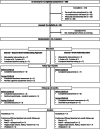Feasibility and preliminary efficacy of the LEAD trial: a cluster randomized controlled lifestyle intervention to improve hippocampal volume in older adults at-risk for dementia
- PMID: 35139918
- PMCID: PMC8826667
- DOI: 10.1186/s40814-022-00977-6
Feasibility and preliminary efficacy of the LEAD trial: a cluster randomized controlled lifestyle intervention to improve hippocampal volume in older adults at-risk for dementia
Abstract
Background: Healthy diet and exercise are associated with reduced risk of dementia in older adults. The impact of diet and exercise interventions on brain health is less consistent, especially with dietary interventions which rely on varying approaches. Our objective was to evaluate the feasibility and preliminary efficacy of a 6-month intervention combining exercise with a novel dietary counseling approach to improve hippocampal volume among older adults at-risk for dementia.
Methods: Participants with vascular risk factors and subjective cognitive decline or early mild cognitive impairment were cluster randomized in groups of 3-4 to the diet intervention (DIET) or control education (ED) group. All participants engaged in 1 h of supervised exercise per week and additional exercise at home. DIET involved 1 h per week of group-based dietary counseling comprising education, goal setting, and strategy training. ED involved 1 h per week of group-based brain health education classes. Our primary outcome was change in hippocampal volume from baseline to 6 months. Secondary outcomes included changes in cognitive function, blood biomarkers, diet, and fitness. Recruitment challenges and early discontinuation of the trial due to COVID-19 necessitated a revised focus on feasibility and preliminary efficacy.
Results: Of 190 older adults contacted, 14 (7%) were eligible and enrolled, constituting 21% of our recruitment target. All participants completed the intervention and attended 90% of exercise and DIET/ED sessions on average. All 6-month assessments prior to COVID-19 were completed but disruptions to in-person testing resulted in incomplete data collection. No serious adverse events occurred and all participants expressed positive feedback about the study. Preliminary findings did not identify any significant changes in hippocampal volume; however, substantial improvements in diet and HbA1c were observed with DIET compared to ED (d = 1.75 and 1.07, respectively).
Conclusions: High adherence and retention rates were observed among participants and preliminary findings illustrate improvements in diet quality and HbA1c. These results indicate that a larger trial is feasible if difficulties surrounding recruitment can be mitigated.
Trial registration: ClinicalTrials.gov identifier: NCT03056508 .
Keywords: Diet; Early MCI; Exercise; Feasibility; Intervention; Subjective cognitive decline; Vascular risk factors.
© 2022. The Author(s).
Conflict of interest statement
The authors declare no competing interests.
Figures
References
-
- Prince MJ, Wimo A, Guerchet MM, Ali GC, Wu YT, Prina M. World Alzheimer Report 2015—the global impact of dementia: an analysis of prevalence, incidence, cost and trends. London: Alzheimer's Disease International; 2015.
-
- Jessen F, Wolfsgruber S, Wiese B, Bickel H, Mösch E, Kaduszkiewicz H, et al. AD dementia risk in late MCI, in early MCI, and in subjective memory impairment. Alzheimers Dement. 2014;10(1):76–83. - PubMed
Associated data
LinkOut - more resources
Full Text Sources
Medical



